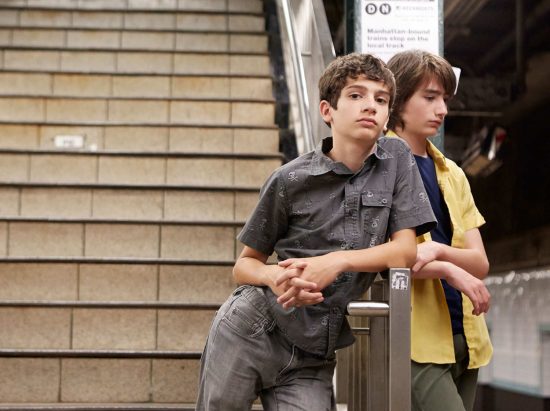Review: Little Men – “Raw and genuine realism”
With each new film, Ira Sachs gets a step closer to becoming the Woody Allen of social drama thanks to his incredibly genuine and nuanced observation of contemporary New York life. The Tennessee-born filmmaker has been living in the Big Apple for a long time now and continues to craft every day life stories where he effortlessly finds the beautiful in the mundane.
After exploring love between gay men of different ages and in rather different moments of their relationship with his previous two films, Keep The Lights On and Love Is Strange, this time around the openly gay filmmaker turns to a coming of age tale about the blooming friendship between two pre-teen boys whose sexuality isn’t the story’s main concern.
Little Men is actually about the adults as much as it is about the children and if anything, it powerfully illustrates how the lines between the two easily tend to blur. Jake and Tony, brilliantly portrayed by young newcomers Theo Taplitz and Michael Barbieri, both at their film debut here, become best friends by chance but their bond is put to the test by adult problems they have a hard time understanding and they try to solve by going on a silence strike against their parents.
Sachs and his co-writer Mauricio Zacharias (who also collaborated on his previous two films) masterfully portray adults who can’t get over their pride and two young boys whose innocent view on life would be enough to sort the issue at hand but who suffer the consequences of their parents’ choices.
Brian (Greg Kinnear), Kathy (Jennifer Ehle) and their son Jake move into Brian’s old home in Brooklyn after his father dies. The apartment is located on top of an old fashion dress shop run by Leonor (Paulina García), Tony’s mum, but the space belonged to Brian’s father. Brian and his sister have inherited the shop and due to the hard economic times and Brooklyn’s increasing gentrification, they have no choice but ask Leonor for a higher lease, which she obviously can’t afford as her business isn’t exactly flourishing.
Tony and Jake click since the very first day they meet. Tony is an extrovert with a confident personality whilst Jake is the exact opposite and Tony is the first true friend he’s ever made. Besides enjoying their time together skating around the city and playing videogames, the kids also share creative aspirations – Jake draws and wants to become an artist whilst Tony is interested in acting and even drags Jake to an improv class, in one of the film’s funniest scenes.
The boys’ idyllic summer is however ruined when the financial feud between their parents heats up. Brian is a struggling actor who just got cast in an off Broadway play and his wife, a psychotherapist, is the family’s breadwinner. Besides personal issues of manly pride, he shares the inheritance with his sister and eventually has to listen to her pressure about evicting Leonor, if the woman won’t agree to the new lease terms.
Leonor on the other hand reveals how she had become a close friend to Brian’s father, and tries to push the man to respect what would’ve been his old man’s will to keep her on a lower lease. But Brian won’t nudge and she plays the emotional card, claiming that she’d been there for Brian’s father way more than him in recent years.
The entire cast couldn’t be more in tune with each of their respective characters’ psycho-emotional state and though it’s no surprise that seasoned, albeit underrated, pros like Kinnear would offer this kind of subtle, classy performance, it’s the kids who steal the show. Both Taplitz and Barbieri demonstrate to be wise beyond their years as they tap into Jake’s and Tony’s sensibility with incredible insight.
Of course Sachs is an actors’ director but he also deserves a lot of credit since directing youngsters at their first film is no easy task. The boys however seem to have been the perfect match for the filmmaker’s storytelling qualities. Their friendship comes across as extremely authentic and heartbreakingly so, especially when jeopardized by their parents’ obstinate contrasts.
The level of raw and genuine realism in these kids’ relationship is all summed up by the nuanced way Sachs handles their bond. If you pay attention, you could see the signs of Jake being potentially in love with Tony yet things are believably portrayed. When Jake observes Tony flirting with a girl at a kids’ matinee disco, his melancholy eyes might as well be just those of an introverted kid who’s jealous of losing his best friend’s attention and prefers staying in a corner drawing rather than mingling with his piers.
Longing looks and unspoken words are stronger and more effective than any explicit communication could be because at the end of the day, Sachs is indeed portraying a formative time when we are still confused and exploring the world, trying to make sense of everything, let alone of who we are. The writer/director is undoubtedly a profound auteur able to aptly capture these peculiar, humanity-defining feelings and leave you with a lingering sense of melancholia that’s hard to shake off after credits roll.











